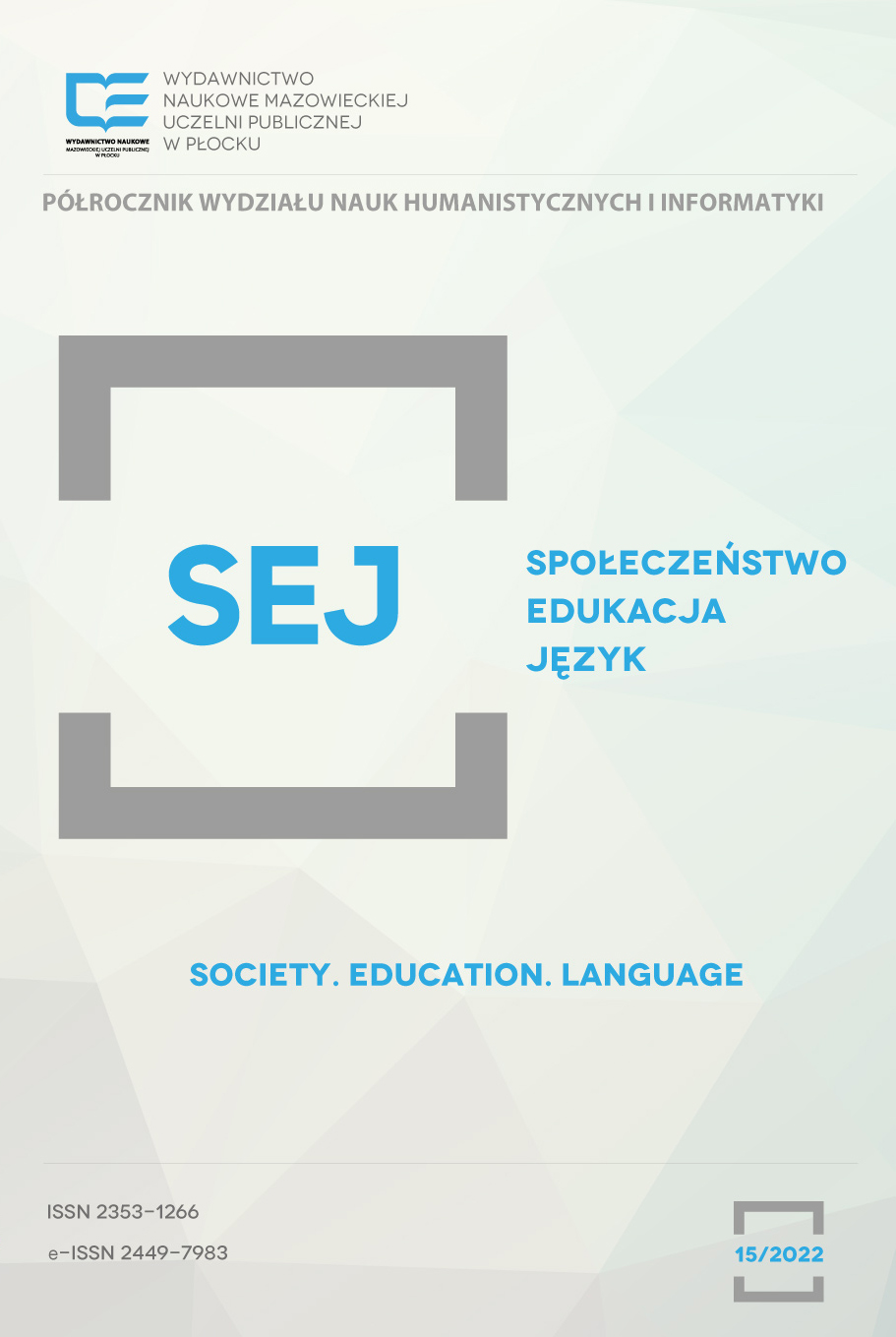THE IMPACT OF THE DOUBLE LOCKDOWN ON THE EDUCATION OF PRIMARY SCHOOL PUPILS AND THEIR BEHAVIOUR AFTER RETURNING TO SCHOOL IN THE OPINION OF TEACHERS
DOI:
https://doi.org/10.19251/sej/2022.15(12)Keywords:
student,, teacher, pandemic, remote education, IT skillsAbstract
Due to the implementation of remote education on an unprecedented scale, questions arose about its quality and course, and about the behaviour of pupils after returning to school from lockdown. This type of situation was a motivation for conducting pedagogical research, the main aim of which was to learn about teachers' opinions on remote education, to identify their priorities and to evaluate the behaviour of pupils after returning to school from lockdown. The study included teachers (N = 60) from primary schools in the area of two cities: Biała Podlaska and Częstochowa. The results of the research made it possible to get to know the opinion of the surveyed group of teachers on the assumed research goal. It turned out that teachers see the good sides of this form of education, mainly related to improving IT skills of students in grades 1-8, but they also specified its weaknesses. They identified several important recommendations that could be used by people from educational backgrounds in the future, which is important given the fact that we live in unpredictable conditions and at the same time to prevent difficulties arising from this.
References
Czerepaniak-Walczak, Maria. 1999. Kompetencja: słowo kluczowe czy „wytrych” w edukacji.Neodidagmata,24,53-66.
Dhawan, Shivangi. 2020. Online Learning: A Panacea in the Time of COVID-19 Crisis. Journal of Educational Technology Systems, Vol. 49 (1) 5-22, DOI:10.1177/00472395 20934018.
Di Pietro, Giorgio., Biagi, Federico., Costa, Patricia., Karpiński, Zbigniew i Mazza, Jacopo. 2020. JRC Technical Report The likely impact of COVID-19 on education: Reflections based on the existing literature and recent international datasets. Joint Research Center, Luxembourg: Publications Office of the European Union, DOI:10.2760/126686.
Feiner, Małgorzata i Went Wiesław.1997. Nowe zadania nauczyciela. Edukacja i Dialog,9,3-4.
Głos Nauczycielski, Badanie z 25.06.2020 r. Zdalne nauczanie a adaptacja do warunków społecznych w czasie epidemii koronawirusa. Przeprowadzone przez Polskie Towarzystwo Edukacji Medialnej, Fundację Dbam o Mój Zasięg i Fundację Orange. Dostęp: 20.11.2021. w: https://glos.pl/page/2.
Głowicki, Piotr. 2010. Współczesne rozwiązania w zakresie modelowania systemów nauczania hybrydowego. Polskie Stowarzyszenie Zarządzania Wiedzą, Seria: Studia i Materiały, 28,71-82.
Kędzierska, Barbara. 2005. Informatyczne kształcenie i doskonalenie nauczycieli. Kraków: Wydawnictwo Naukowe Akademii Pedagogicznej.
Kruszewska, Aleksandra., Nazaruk, Stanisława i Szewczyk, Katarzyna. 2020. Polish teachers of early education in the face of distance learning during the COVID-19 pandemic – the difficulties experienced and suggestions for the future. Education 3-13, Francis & Tylor, https://doi.org/10.1080/03004279.2020.1849346
Kubiak, Mirosław. 2003. Próba stworzenia uniwersalnej definicji kształcenia na odległość Wirtualna Edukacja, Czasopismo elektroniczne,17/10.
Nadeak, Bernadetha.2020. The Effectiveness of Distance Learning Using Social Media during the Pandemic Period of COVID-19: A Case in Universitas Kristen Indonesia. International Journal of Advanced Science and Technology, 29 (7),1764-1772.
Pilch, Tadeusz i Bauman, Teresa. 2001. Zasady badań pedagogicznych. Strategie ilościowe i jakościowe. Warszawa: Wydawnictwo Akademickie Żak.
Rahim,Amena., Ali, Shazia., Ali Shabana i Fayyaz, Humaira.2020. ONLINE EDUCATION DURING COVID -19 PANDEMIC; AN EXPERIENCE OF RIPHAH INTERNATIONAL UNIVERSITY FACULTY OF HEALTH AND MEDICAL SCIENCES. Pakistan Armed Forces Medical Journal, SpecialIssue2,Vol.70 (2),506-512.
Raport MEN, Zapewnienie funkcjonowania jednostek systemu oświaty w okresie epidemii COVID-19. Dostęp: 26.01.2021.
https://dokumenty.men.gov.pl/Raport_MEN_Zapewnienie _ funkcjonowania_ jednostek_systemu_oswiaty _w_okresie_epidemii_COVID-19.pdf.
Wach-Kąkolewicz, Anna.2013.Problemy współczesnej pedagogiki. Neodidagmata,35,3-19.
Zhang, Lei i Yunhui Liu. 2020. Potential interventions for novel coronavirus in China: A systematic review. Journal of Medical Virology, New York, Wiley, https://doi.org/10.1002/jmv.25707.
Ustawa z dnia 2 marca 2020 r. o szczególnych rozwiązaniach związanych z zapobieganiem, przeciwdziałaniem i zwalczaniem COVID-19, innych chorób zakaźnych oraz wywołanych nimi sytuacji kryzysowych (Dz. U.2020, poz.374).
Rozporządzenie Ministra Edukacji Narodowej, z dnia 20 marca 2020, w sprawie szczególnych rozwiązań w okresie czasowego ograniczenia funkcjonowania jednostek systemu oświaty w związku z zapobieganiem, przeciwdziałaniem i zwalczaniem COVID-19 (Dz.U. 2020, poz. 493).
